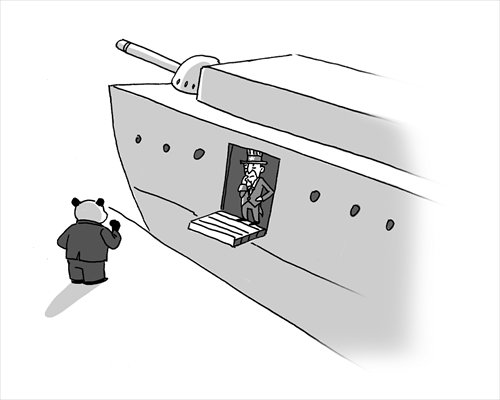HOME >> OP-ED
RIMPAC discussion exposes US prejudices against China
Source:Global Times Published: 2015-5-21 22:53:01

Illustration: Liu Rui/GT
Should China be invited to the 2016 Rim of the Pacific Exercise (RIMPAC)? The discussion over the issue is heatedly unfolding in the US, with some opponents arguing that Beijing should pay some price for its recent land reclamation activities in the South China Sea.
Such biased comments against China from the US are hardly new. Over the years, there have been various media reports and individual remarks from Washington that poured cold water on the Sino-US relationship.
Certain US congressmen identify China and the Chinese army as a putative foe for their personal ends. They spread the "China threat" theory in order to make more countries feel insecure, which will in turn seek more US protection or purchase more US weapons. In this way they can better boost the defense industry in their own constituencies.
In the meantime, some US scholars and media are looking at Beijing with a Cold War mind-set. They are firmly convinced that the rise of China will alter the international order. Against such backdrop, the territorial disputes in the South China Sea provide a perfect excuse for them to provoke conflicts between China and some other claimants, nudging more nations to rush for Washington's shelter, which in the end, will ensure US dominance in the Asia-Pacific region.
When it comes to the South China Sea, the White House has been operating under double standards for a long time. The truth is, countries including the Philippines and Vietnam, have illegally built up, and are constructing, a number of bases, ports and docks on the Chinese reefs of Nansha Islands, but the US kept turning a blind eye to them.
In a sharp contrast, Washington has never stopped its accusatory tone against China's construction in the same region, which exposed nothing but its prejudice and attempt to use the maritime disputes to contain the rise of China.
The US should recognize that it adopted similar strategies of containment for 30 years since the founding of the People's Republic of China in 1949, but they didn't work. Therefore, those US scholars, congressmen and media should see the facts, and stop the Cold War mind-set of seeking further confrontation.
Rivalry against the US has never been China's intention. Just as Chinese President Xi Jinping put it, "The broad Pacific Ocean is vast enough to embrace both China and the US."
The reason why Washington is constantly aiming at China stems from the fact that quite a few US theorists and politicians tend to ponder issues based on only hypothesis. What if Beijing wants to alter the global order? What if China wants to create a new international system that is centered on itself? Yet the real question should be, why do they have to see China this way? Why don't they make such assumptions about other countries? Regardless of "assumptions," Japan is actually breaching the postwar international order, and it seems that the White House connives at it.
China has always been supporting the existing postwar global order. We appeal for justified and reasonable reform, but Beijing has never intended to break the rules or reinvent the wheel.
In terms of RIMPAC, there is apparently no need for Washington to find a variety of reasons against Beijing. The US used to blame China for not being open and transparent enough. Inviting China to the joint military drill could hence help it get to know the Chinese military's development, strengths and intentions better, which will help bridge the gap and reduce misunderstandings.
For the moment, China and the US are experiencing more collaboration than differences. We should keep deepening such bilateral communication, lowering and controlling the divergences through cooperation and avoiding them affecting the big picture.
The article was compiled by Global Times reporter Li Aixin based on an interview with Zhang Junshe, a research fellow at the Chinese Naval Research Institute. liaixin@globaltimes.com.cn
Posted in: Viewpoint